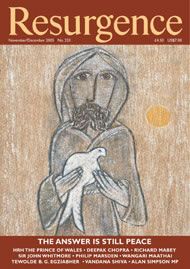I'M THE SHOPPER in our family, and I enjoy this role. But there is one thing that disturbs my weekly grocery trip: the grating sound of metal baskets and trolleys.
In my early childhood I discovered that I have a modest talent for music, and all my life I have been sensitive to sound. In my undergraduate days, working on a degree in music composition, I took a course in 'ear training', which only made my problem with the soundscapes of daily life worse. The course that really 'ruined' my ears was the study of orchestration, when I learned to make fine distinctions in the sonorities of the various instruments of the orchestra. It has been both a blessing and a curse to be so acutely aware of the sounds around me.
Before university, I lived for thirteen years in a monastery, where an atmosphere of quiet was part of the rule. We observed silence strictly from late evening to early morning. I still try to keep the monk alive in me, and no doubt the love of stillness goes back to those days of monastic calm.
The word 'silence' apparently derives from a word that means 'to sit down'. Silence is a way of enjoying a pause in an otherwise busy and noisy life. It's a positive thing. I remember going on week-long retreats in my monastery days, when the undisturbed quiet allowed me to notice more the sounds of the wind, the bees and birds, and, if it was a truly effective retreat, the flutter of butterflies.
I learned in the monastery, too, that you can evoke silence with architecture, furnishings, and colour. My family and friends know my taste for muted greys and browns. Neatness and cleanliness help quiet the world, and a serene photograph or painting makes its contribution, too.
The room in my house where I work tends to be cluttered. Books and papers arrive in great number every day, and though I try occasionally to keep up with the torrent, I rarely manage a clean desk and a well-ordered bookshelf. But, in those rare moments when the devastation has been conquered, I sense the silence in the place. I feel inspired, and for a few minutes, before the post arrives, I know what it's like to be spatially quiet.
People speak of noise pollution, but in society at large I see no indication that it is a real concern. Yet noise contributes to the anxiety of our age. If the quiet sounds of a dancing brook and the soothing music of the sea calm and quiet a person, imagine what the roar of jets and the constant drum of traffic do. Sounds are as much a part of the environment as beautiful parks and unsettling trash. They colour the spaces in which we live, and they have an impact on us, even if we are unaware of their presence.
The subtle power of sound is like that of aromatherapy. If slight tinctures can so powerfully affect your mood and thoughts, what do the ordinary smells of car exhaust and refineries do to us? If Mozart and Bach can raise the spirits, what do the noises of factories and traffic congestion do? A study in Sweden suggests that people living near an airport have more problems with high blood pressure than other citizens in the city. Where do you work? What is the level and shape of sound there?
I play the piano for silence. The sounds coming out of my finger action scatter the activities and concerns that are the 'noise' of daily life. Sometimes I find more silence at the piano than in a quiet room reading or studying. The absence of sound doesn't always create silence because, like everything else, silence is not a literal thing. The most quieting sound I know is the tumble of water over the stones of a mountain stream. One day I took my recorder to a nearby stream and now, when I crave some silence, I listen to that brook and get away from the noisy thoughts of my soundless work of writing.
I don't want to moralise and romanticise in my rant against noise. Silence is important, but so are loud signs of vitality and music that wake your innards. But we seem well skilled at making noise and unconscious about the beauty of silence. It seems that we assume that there is nothing to do about sounds; that there is no art of silence and no practical purpose for it anyway.
But silence is a taste of the eternal, which is a natural part of us. If we are noisy and active all the time, we will never know the invisible world that is interior to us and to everything. It's no accident that a church or temple might be a place where you can discover the forceful strength and healing power of quiet and stillness. The place is full of spirits, which move invisibly and make their soundless noises, which are sometimes captured in chant and polyphony and in the motionless drone of a harmonium and the otherworldly twang of a sitar.
Silence is a way of listening to the subtle sounds that keep the world on course. Pythagoras said he could hear the music of the planets making their rounds. Some adepts know well the cosmic sound of Om. I feel that different kinds of music take me to various places in the geography of the soul and spirit. Individually we may need to cultivate the active art of silence. Culturally, too, we might rediscover our interiority and the subtle qualities of the world through quiet. We might calm ourselves sufficiently to stop reacting so quickly and thoughtlessly to events. International politics might take a giant step forward if the politicians stopped talking for a while and listened to all the information and wisdom floating in the quiet air.
Silence is precious, not because it is literally empty but because it is a kind of fullness. In silence we hear our thoughts and take in the world. We become receivers rather than just doers. We are less active but more alive. When we speak from silence, our voices contain the whispers of a muse, a passing spirit, and an angel. Our words resonate. They are worth listening to, because in them the otherwise silent world finds its voice.
KEEPING QUIET
Now we will count to twelve
and we will all keep still.
For once on the face of the Earth
let's not speak in any language,
let's stop for one second,
and not move our arms so much.
It would be an exotic moment
without rush, without engines,
we would all be together
in a sudden strangeness.
Fishermen in the cold sea
would not harm whales
and the man gathering salt
would look at his hurt hands.
Those who prepare green wars,
wars with gas, wars with fire,
victory with no survivors,
would put on clean clothes
and walk about with their brothers
in the shade, doing nothing.
What I want should not be confused
with total inactivity.
Life is what it is about;
I want no truck with death.
If we were not so single-minded
about keeping our lives moving,
and for once could do nothing,
perhaps a huge silence
might interrupt this sadness
of never understanding ourselves
and of threatening ourselves with death.
Perhaps the Earth can teach us
as when everything seems dead
and later proves to be alive.
Now I'll count up to twelve
and you keep quiet and I will go.
From Pablo Neruda, Extravagaria,translated by Alastair Reid (Farrar, Straus & Giroux, USA, 2001)








